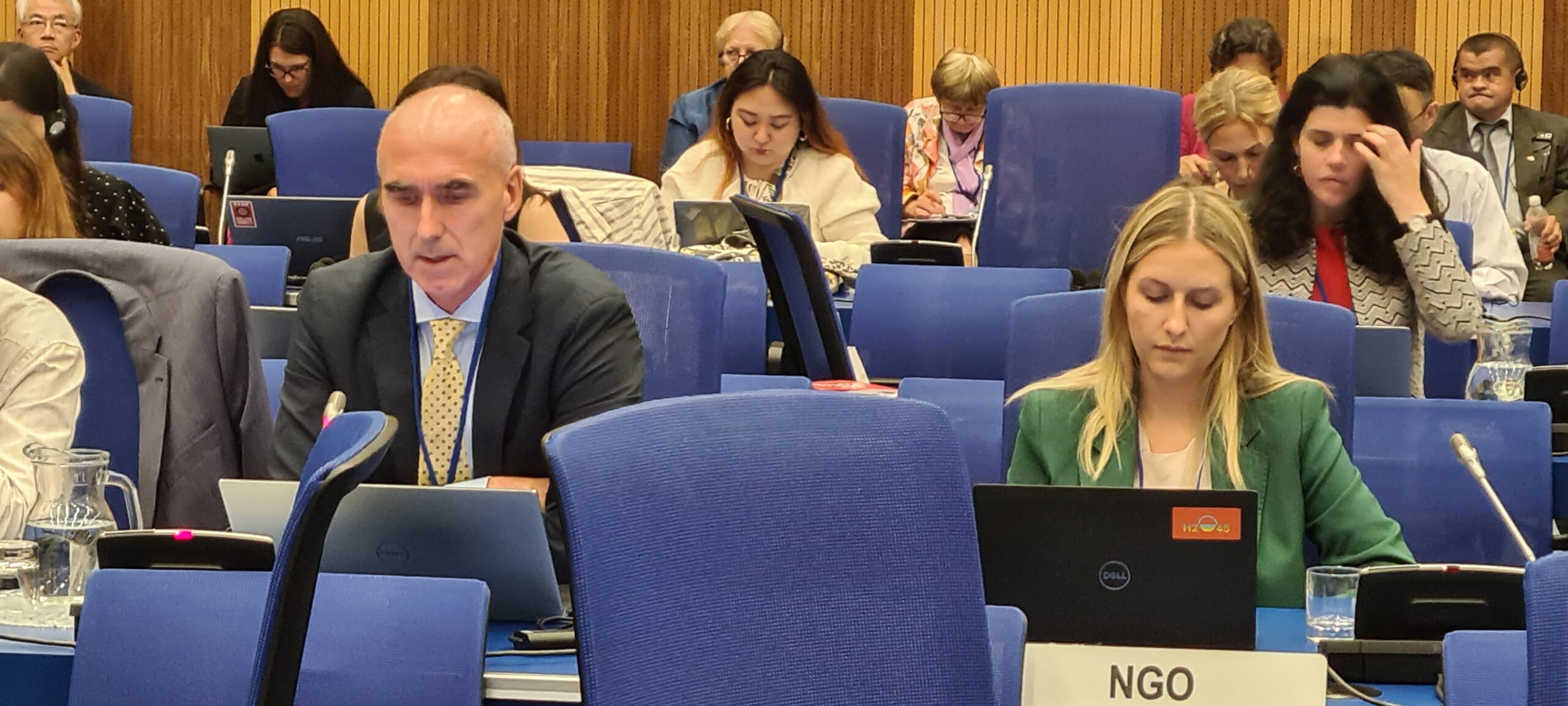A group of 170 civil society organizations from 37 countries called today on the nuclear armed and allied members of the Nuclear Non-Proliferation Treaty to replace their reliance on nuclear deterrence with common security.
The call came in a joint statement Common Security v. Nuclear Weapons: How to replace the current reliance on nuclear deterrence with sustainable security for all, which was presented to a special plenary meeting of the 2023 NPT Prep Com at the United Nations in Vienna by John Vlasto, Chair of the Executive Committee of the World Federalist Movement – Institute for Global Policy.
“There are currently nine nuclear armed countries and another 37 countries that rely on nuclear deterrence,” said Mr Vlasto introducing the statement. “Although a numerical minority amongst UN member states, these countries together comprise most of the northern hemisphere and nearly 2/3rds of the world’s population.”
“The primary reason for the reliance on nuclear weapons by such a significant number of countries is because nuclear deterrence is perceived by them as providing security, especially from acts of aggression. Nuclear weapons will most likely continue to be a part of security doctrines until the nuclear armed and allied states can be confident that the security provided by nuclear weapons is no longer necessary, or that nuclear deterrence can be replaced by alternatives which are credible. Common Security could provide such credible alternatives, and therefore make a vital contribution to building the framework for the peace and security of a nuclear-weapon-free world.”
Mr Vlasto outlined key common security mechanisms which are available – but which could be better used and strengthened – to provide non-nuclear protection against aggression and other threats. These include, amongst others, the UN General Assembly, International Court of Justice and the Organisation for Security and Cooperation in Europe.
With regard to the UN General Assembly, Mr Vlasto highlighted the adoption in April 2022 of the UNGA resolution “Standing mandate for a General Assembly debate when a veto is cast in the Security Council”, which has strengthened the process for the UNGA to act in the face of aggression or threats to the peace. “The UNGA has taken a number of actions including declaring the Russian invasion of Ukraine to be an act of aggression in violation of the UN Charter and declaring that the annexation by Russia of Ukrainian territories is invalid and illegal,” said Mr Vlasto.
With regard to the International Court of Justice (ICJ), Mr Vlasto noted that it has demonstrated in numerous contentious cases and advisory opinions that it can address aggression (including the threat or use of nuclear weapons), territorial conflicts and other threats to the peace.
“Increased use of the court in such cases – and broader acceptance of the jurisdiction of the ICJ – would build confidence in the capacity of common security to replace nuclear deterrence,” said Mr Vlasto. “We therefore encourage all States that have not done so to declare their acceptance of ICJ jurisdiction. We welcome the Declaration on promoting the jurisdiction of the International Court of Justice which 33 countries have endorsed, and we welcome also the civil society initiative entitled Legal Alternatives to War, Towards universal jurisdiction of the International Court of Justice.”
Mr Vlasto also welcomed the ‘remarkable statement’ in the G20 Leaders November 2022 Bali Declaration that ‘the threat or use of nuclear weapons is inadmissible’.
“This statement demonstrates that there is a openness by the nuclear armed and allied states to reduce and eventually eliminate the role of nuclear weapons,” said Mr Vlasto “It provides fertile ground for the NPT to take up our recommendation to establish a subsidiary body to explore the replacement of nuclear deterrence with common security.”
“Indeed, in an increasingly inter-connected and globalized world, nuclear deterrence already has much less utility – combined with very high risks – whereas Common Security has much greater potential and relevance to meet current and emerging security issues, reduce tensions, resolve international conflicts and ensure sustainable peace,” concluded Mr Vlasto.

